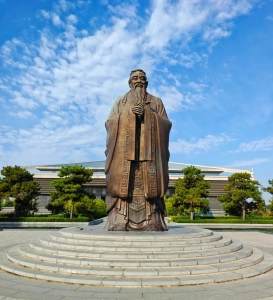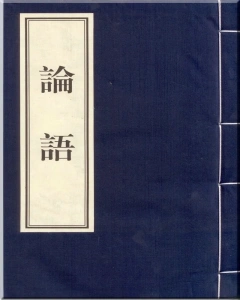
Confucianism traces its origins back to Confucius (551–479 BCE), a renowned philosopher and teacher in ancient China. Born in the state of Lu, Confucius faced a society marked by political instability and social disorder. This environment heavily influenced his thoughts, which centered on the restoration of moral order in society. His teachings, known as Confucianism, were later compiled by his disciples into the Analects of Confucius (Lunyu). The Analects serve as the core text of Confucian philosophy and reflect Confucius’ deep concern with ethics, social harmony, and governance.
At the heart of Confucianism are five core virtues: Ren (仁, benevolence), Yi (义, righteousness), Li (礼, propriety), Zhi (智, wisdom), and Xin (信, trustworthiness). These values form the foundation of Confucian thought, emphasizing moral integrity and the importance of cultivating one’s character. Confucianism stresses the idea that a harmonious society can only exist when individuals act according to these principles.
Together, these principles are not only central to Confucian beliefs but also reflect the essence of Confucian philosophy, guiding individuals towards moral and ethical excellence.

The Analects of Confucius is the most significant text in Confucianism, composed of sayings and teachings attributed to Confucius and his disciples. It covers a wide range of topics, including ethics, governance, personal development, and education. The Analects emphasize the importance of filial piety, social harmony, and the cultivation of virtue. Through its concise and profound statements, the Analects remains a timeless guide for those seeking wisdom in moral living and leadership.
Beyond the Analects, several other texts contribute significantly to Confucian philosophy.

Confucianism profoundly shaped China’s political system, social structures, and legal systems. During the Han Dynasty, Confucianism became the state philosophy, which shaped China’s imperial bureaucracy and governance. The civil service exams were based on Confucian teachings, ensuring that officials were not only competent but also morally upright. Confucianism’s emphasis on Li (propriety) helped establish a hierarchical society where respect for authority, tradition, and familial bonds were paramount. Additionally, Confucian ethics played a significant role in shaping Chinese law, emphasizing morality over strict punishment.

Confucianism spread beyond China and had a lasting impact on neighboring countries, particularly Korea, Japan, and Vietnam. In Korea, Confucianism influenced governance, family structures, and education, forming the foundation of Korean societal values. Similarly, in Japan, Confucian principles helped shape the samurai code of ethics and influenced the relationship between rulers and subjects. In Vietnam, Confucianism played a vital role in shaping the country’s education system and political philosophy, particularly during the Le Dynasty.
Confucianism has also had an intellectual exchange with Western philosophy. While Confucianism focuses on social harmony and collective well-being, Western thought often emphasizes individualism and liberty. However, both traditions share a deep concern for ethical conduct and moral responsibility. Modern scholars have increasingly engaged with Confucian ideas, particularly in discussions of ethics, leadership, and community. The dialogue between Confucianism and Western philosophy continues to be a valuable source of cross-cultural understanding.
During the Song Dynasty (960–1279 CE), Neo-Confucianism emerged as a response to the growing influence of Buddhism and Daoism. Neo-Confucian thinkers like Zhu Xi and Wang Yangming integrated Confucian ethics with metaphysical and cosmological ideas, seeking to explain the universe and human nature in a more systematic way. Neo-Confucianism became the dominant school of thought in China for centuries and remains influential in East Asia.
In today’s world, Confucianism continues to offer valuable insights into modern issues such as environmental sustainability, social justice, and leadership. For instance, Confucianism’s emphasis on Ren (benevolence) and Li (propriety) aligns with contemporary movements that advocate for social responsibility and environmental protection. Confucian thought encourages leaders to serve the public good, emphasizing moral integrity and the well-being of society. As the world grapples with global challenges, Confucianism offers a moral compass that encourages reflection, balance, and harmony in both personal and societal contexts.
Discover rich Chinese traditions and cultural practices through festivals, customs, and history.

 English (US)
English (US)